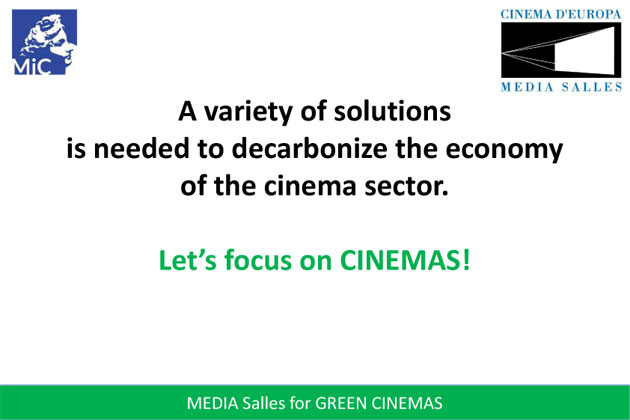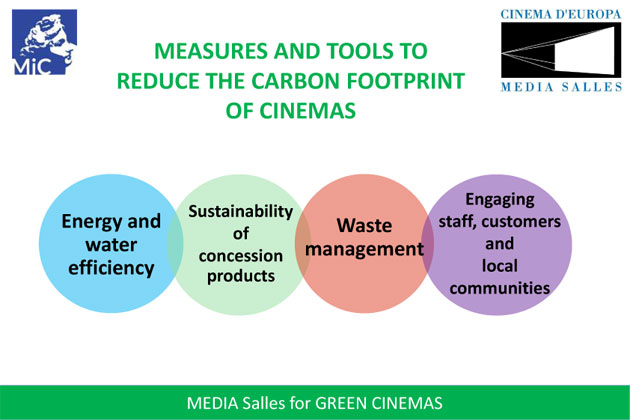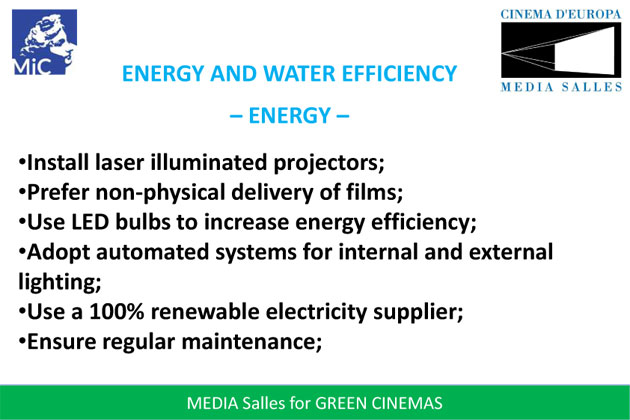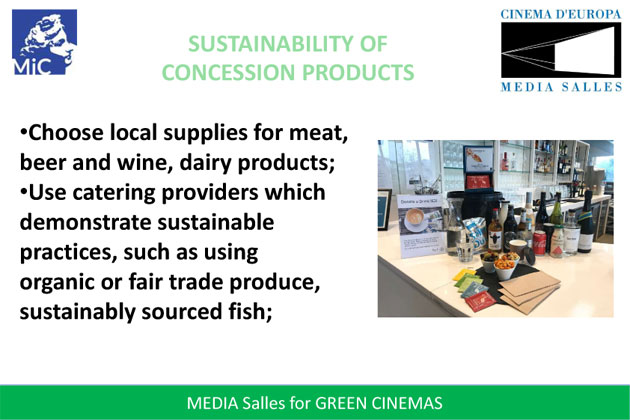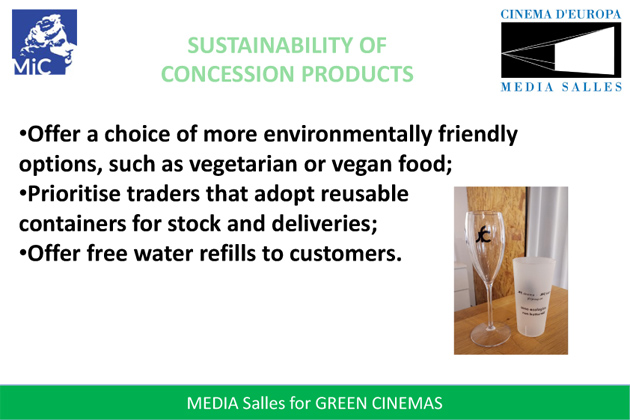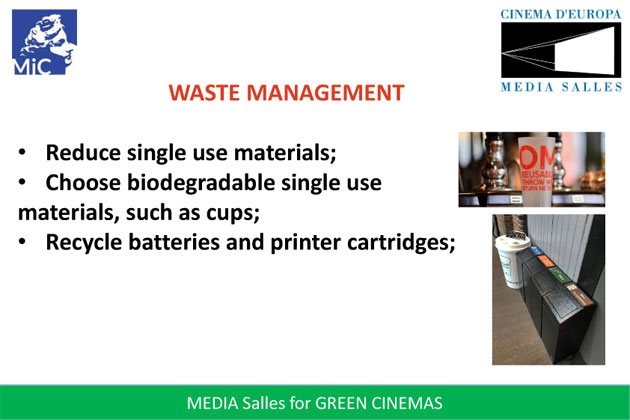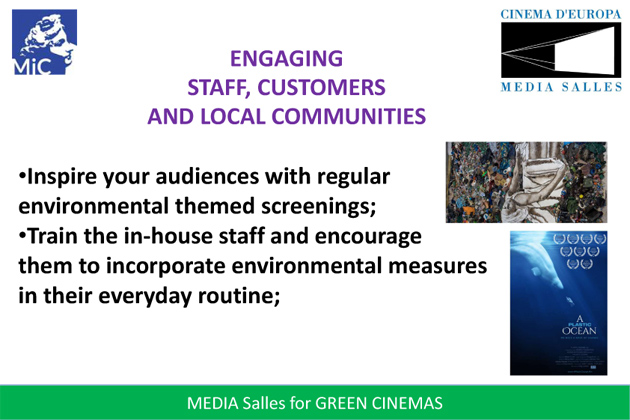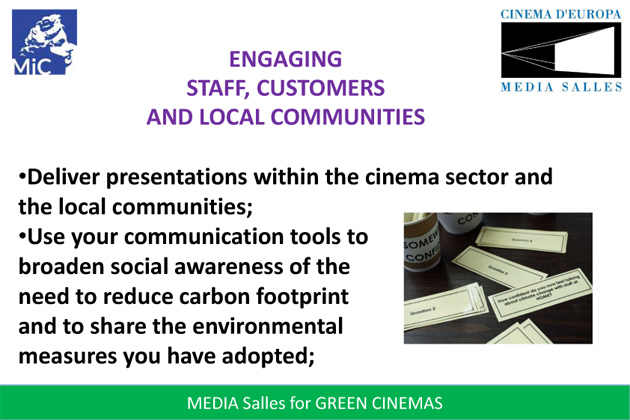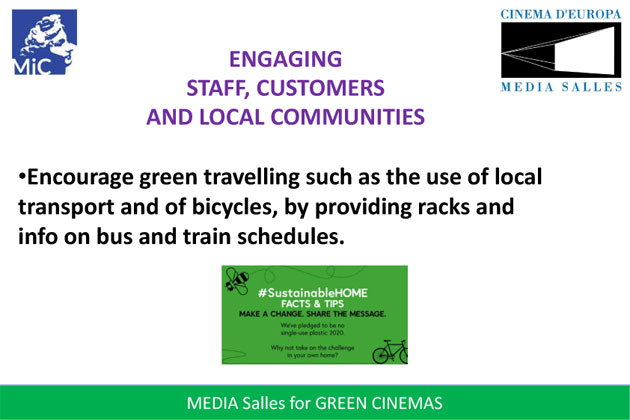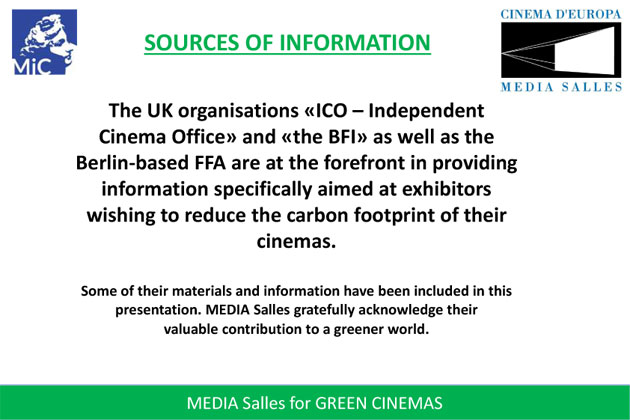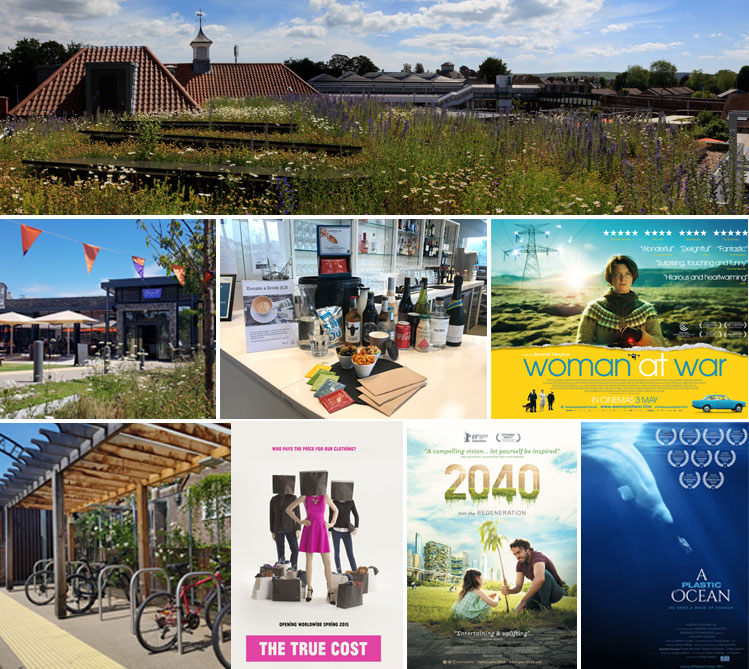
Reg. Trib. Milano n. 418 del 02.07.2007
- Direttore responsabile: Elisabetta Brunella
 |
 |
International Edition No. 186 - year 16 - 17 September 2021

Special issue on the occasion of the 17th CineFest - Miskolc International Film Festival 2021
more than 15,000 subscribers |
|
|||
|
| |||
GREEN CINEMAS |
|||
| |||
GREEN CINEMAS
Since some years, MEDIA Salles has been investigating best pratictes in cinema exhibition aimed at reducing the environmental impact. We think this is - more than ever - a key topic and we are glad inagurate in our newsletter a column dedicated to sustainability in the cinema sector: we hope it could be of inspiration for our readers, and invite you to contact us in case you want to share news and ideas on the subject.
Let's be sincere: amongst the investments needed to create a new, technologically advanced, cinema, money for the installation of a ground source heat pump is not the first thing that springs to mind. We might quote immersive sound systems, 2K and 4K projectors, perhaps laser illuminated… Yet, at the Depot in Lewes, East Sussex, England (almost on the Channel coast and only a short distance from the more famous Brighton), they have all this and a heat pump as well. The little complex - comprising three screens, for a total of 307 seats and a café-restaurant - opened its doors in 2017 in the centre of this town of around 16,000 inhabitants, on the spot where a brewery depot once stood. The design was organically conceived by two local cinema fans with the aim of demonstrating that it really is possible to reduce the ecological footprint left by places of entertainment. Architects Burrell, Foley and Fischer adopted innovative solutions which were nonetheless deeply rooted in tradition, to create a building with low environmental impact. Starting with the afore-mentioned pump which, taking advantage of the relatively stable temperature of the ground throughout the seasons and thanks to an underfloor heating system, makes it possible to reduce the use of fossil fuels in the winter months and avoid air conditioning in the summer - using roof vents in the restaurant area. To improve heat and sound insulation, a living roof has been created using local plants, fed by rainwater, which also makes the building more attractive to the eyes of its neighbours. And which obviously recalls the traditional thatched roofs, including their hospitality to insects but also birds and bats, all of which find shelter in the special nesting holes built beneath the roofline. As regards the electricity, solar panels have been installed and a contract stipulated with a company that distributes energy from renewable sources. The management of the cinema and the restaurant, but also the programming, are in line with the values inspiring the building. Just for a start, the Depot has a "green ambassador" who has the task of guaranteeing that day-to-day choices respect the founding principles, as well as involving as many stakeholders as possible in this strategy. The restaurant services, for example, rely on local producers and distributors: a map on the cinema's site makes it possible to locate the various local suppliers - such as the farms providing the milk, dairy products and beef - which have actually become the Depot's partners in this endeavour to protect the environment. Obviously the majority of these choices have been possible because this is a brand new building, and yet the Depot has a lot to teach existing cinemas, too. Starting from the technology: at the Depot two of the three screens use laser lamps, which are more expensive but longer lasting and less consuming than the Xenons. Around 80% of the screenings are based on films delivered via LANsat, which makes it possible not only to do without physical supports but also without the vehicles that transport the DCPs from one cinema to another. Still on the topic of transport, the Depot explicitly discourages the use of cars and offers a safe parking space for bicycles, as well as monitors where audiences can check the local transport schedules in real time. Waste sorting and recycling is almost maniacal and, understandably, requires a good deal of care and a lot of time. But the Depot is a not for profit organisation and the charity that runs it can count on numerous volunteers, as well as its own staff. The quality-film formula, on which the Depot's programming is based, as well as its commitment for environmental sustainability, has indeed proved a winner with the Lewes community and ensured great support for the cinema. The programmers "repay" this by offering productions on environmental themes and hosting local-interest events, as dual initiatives with a local brand of sustainable fashion. Whoever already has a cinema but wishes to share the Depot's "mission" can pay a personal visit - just like the Secretary of State for the Environment on 9th July - or read the "decalogue" that Natasha Padbury, green ambassador, proposed as a source of inspiration to her exhibitor colleagues. Or discover the stories of the more traditional British cinemas that have decided to "go green". But more of this another time… This article was published in the Venice Film Festival special issue of Cinema & Video Int'l, the MEDIA Salles media partner.
|
To quickly get to the previous issues, click on these buttons!
 |
MEDIA Salles Piazza Luigi di Savoia, 24 - 20124 Milano - Italy Tel.: +39.02.6739781 - Fax: +39.02.67397860 E-mail: infocinema@mediasalles.it |
|
 the Miskolc Cinefest - Hungary’s most important international cinema event - is back on route, after a year’s closure. And this 17th edition has once again renewed the appointment with the country’s exhibitors. At the heart of the professional meeting are obviously the strategies for re-opening theatres, including a widespread and many-sided advertising campaign for winning spectators back to the big screen. But alongside this short-term objective, the focus is clearly on the ecological transition of the cinema, a sign of determination to imagine theatres in the near future. The exchange was opened by the overview offered by MEDIA Salles based on the survey carried out of Europe’s best practices, which aim to reduce the environmental impact of a sector that by its very nature devours energy. We offer a glimpse of them, followed by a portrait of the Depot in Lewes, Great Britain, which has become an emblematic case in the field of Green Cinemas.
the Miskolc Cinefest - Hungary’s most important international cinema event - is back on route, after a year’s closure. And this 17th edition has once again renewed the appointment with the country’s exhibitors. At the heart of the professional meeting are obviously the strategies for re-opening theatres, including a widespread and many-sided advertising campaign for winning spectators back to the big screen. But alongside this short-term objective, the focus is clearly on the ecological transition of the cinema, a sign of determination to imagine theatres in the near future. The exchange was opened by the overview offered by MEDIA Salles based on the survey carried out of Europe’s best practices, which aim to reduce the environmental impact of a sector that by its very nature devours energy. We offer a glimpse of them, followed by a portrait of the Depot in Lewes, Great Britain, which has become an emblematic case in the field of Green Cinemas.



